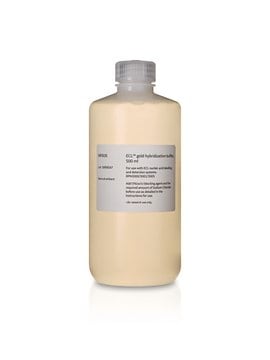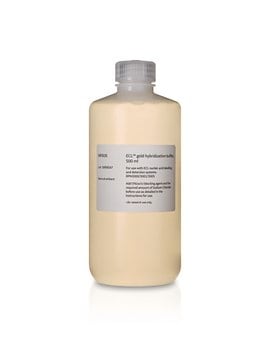GERPN3005
ECL™ Direct Nucleic Acid
Cytiva RPN3005, pack of 1 ea
Sign Into View Organizational & Contract Pricing
All Photos(1)
About This Item
UNSPSC Code:
41105300
NACRES:
NA.31
Recommended Products
packaging
pack of 1 ea
manufacturer/tradename
Cytiva RPN3005
storage temp.
2-8°C
Related Categories
General description
ECL™ Direct Labeling Module.
Application
ECL™ Direct Nucleic Acid Labeling and Detection Systems are based on the direct labeling of DNA or RNA probes with horseradish peroxidase (HRP) in a simple 20 min chemical reaction. The resulting probe can be used without purification. Detection is achieved by generation of light via the HRP-catalyzed breakdown of luminol.
Each system includes the following reagents, sufficient for labeling 5 to 10 μg nucleic acid and detecting 2000 to 4000 cm2 of membrane (depending on product ordered): labeling reagent, crosslinker, control DNA, blocking agent, ECL™ Detection Reagents, and ECL™ Gold Hybridization Buffer.
Each system includes the following reagents, sufficient for labeling 5 to 10 μg nucleic acid and detecting 2000 to 4000 cm2 of membrane (depending on product ordered): labeling reagent, crosslinker, control DNA, blocking agent, ECL™ Detection Reagents, and ECL™ Gold Hybridization Buffer.
Storage and Stability
Please be aware this product may be shipped 90 days before the expiration date. For more information on the batch specific expiration date, please contact technical service.
Analysis Note
To view the Certificate of Analysis for this product, please visit www.cytiva.com.
Legal Information
ECL is a trademark of Cytiva
related product
Product No.
Description
Pricing
Signal Word
Danger
Hazard Statements
Precautionary Statements
Storage Class Code
12 - Non Combustible Liquids
Certificates of Analysis (COA)
Search for Certificates of Analysis (COA) by entering the products Lot/Batch Number. Lot and Batch Numbers can be found on a product’s label following the words ‘Lot’ or ‘Batch’.
Already Own This Product?
Find documentation for the products that you have recently purchased in the Document Library.
Senia Rosales et al.
BMC microbiology, 10, 208-208 (2010-08-04)
Tuberculosis persists as a public health problem in Honduras. A better knowledge of the molecular characteristics of Mycobacterium tuberculosis strains will contribute to understand the transmission dynamics of the disease within the country. The aim of this study was to
G Y Akita et al.
Journal of veterinary diagnostic investigation : official publication of the American Association of Veterinary Laboratory Diagnosticians, Inc, 5(2), 154-158 (1993-04-01)
A previously described bluetongue virus (BTV) serogroup polymerase chain reaction (PCR) assay was applied to clinical samples. The sensitivity of the BTV serogroup PCR was increased by the use of non-radioactive chemiluminescent hybridization. Unfractionated whole blood samples from rams experimentally
C Couturier et al.
Arteriosclerosis, thrombosis, and vascular biology, 20(12), 2559-2565 (2000-12-16)
Type II secreted phospholipase A(2) (sPLA(2)) releases precursors of important inflammatory lipid mediators from phospholipids. Some observations have indicated that the sPLA(2), which has been implicated in chronic inflammatory conditions such as arthritis, contributes to atherosclerosis in the arterial wall.
H M Peng et al.
Molecular pharmacology, 54(4), 740-747 (1998-10-10)
The regulation of cytochrome P450 (CYP) 2E1, the ethanol-inducible isoform, is particularly complex. The level is affected by a variety of other foreign compounds, by insulin (as studied in several laboratories), and by triiodothyronine (T3), which has not been previously
K Aogi et al.
Clinical cancer research : an official journal of the American Association for Cancer Research, 5(10), 2790-2797 (1999-10-28)
The analysis of the tissue expression patterns of both the telomerase enzyme and the adhesion molecule CD44 has highlighted these molecules as potential tumor markers. In this study, the expression of these markers was analyzed in frozen tissue samples of
Articles
Background and protocols describing the various methods used by molecular biologists to detect samples of protein or nucleic acids bound to membranes.
Our team of scientists has experience in all areas of research including Life Science, Material Science, Chemical Synthesis, Chromatography, Analytical and many others.
Contact Technical Service








